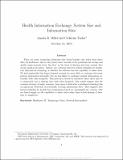Health information exchange, system size and information silos
Author(s)
Miller, Amalia R.; Tucker, Catherine Elizabeth
DownloadTucker_Health information.pdf (316.2Kb)
PUBLISHER_CC
Publisher with Creative Commons License
Creative Commons Attribution
Terms of use
Metadata
Show full item recordAbstract
There are many technology platforms that bring benefits only when users share data. In healthcare, this is a key policy issue, because of the potential cost savings and quality improvements from ‘big data’ in the form of sharing electronic patient data across medical providers. Indeed, one criterion used for federal subsidies for healthcare information technology is whether the software has the capability to share data. We find empirically that larger hospital systems are more likely to exchange electronic patient information internally, but are less likely to exchange patient information externally with other hospitals. This pattern is driven by instances where there may be a commercial cost to sharing data with other hospitals. Our results suggest that the common strategy of using ‘marquee’ large users to kick-start a platform technology has an important drawback of potentially creating information silos. This suggests that federal subsidies for health data technologies based on ‘meaningful use’ criteria, that are based simply on the capability to share data rather than actual sharing of data, may be misplaced.
Date issued
2013-10Department
Sloan School of ManagementJournal
Journal of Health Economics
Publisher
Elsevier
Citation
Miller, Amalia R., and Catherine Tucker. “Health Information Exchange, System Size and Information Silos.” Journal of Health Economics 33 (2014): 28–42.
Version: Author's final manuscript
ISSN
0167-6296